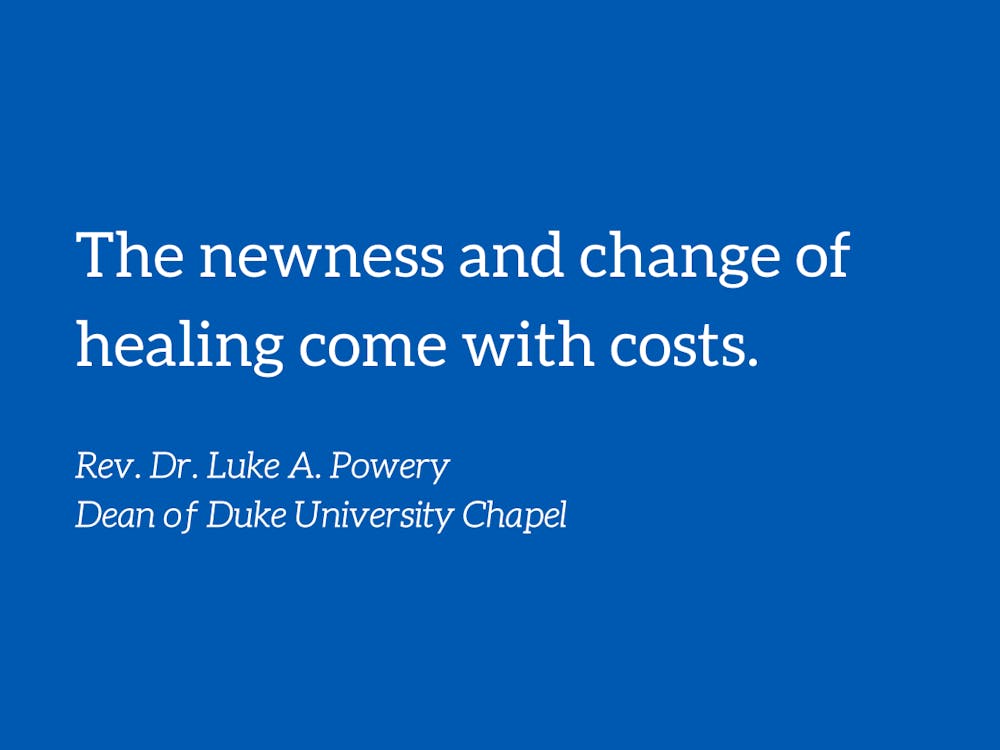As we walk through the current health pandemic and related social pandemics, there’s a lot of grief and lament, but as people get vaccinated and the virus metrics move in a better direction, there is also talk about healing. There is hope as we anticipate a healing process of sorts, one in which a kind of wholeness of relationships is restored, where we are no longer socially distant and people no longer get sick with the coronavirus at the same rates. As we look forward to these positive developments, it’s worth remembering something less obvious: the newness and change of healing come with costs.
There’s a wild Bible story that illustrates this.
The fifth chapter of the Gospel of Mark describes a naked man who lived among the tombs and no one could restrain him with chains or anything else. He howled wildly and bruised himself with stones. The writer says he had “an unclean spirit” and his name was “Legion,” which meant that his problems were huge and as large as a Roman army of four to six thousand soldiers. He was clearly tortured and one might say that a storm raged in his life. His storm was his norm. When he encounters Jesus, he begs him not to torment him when in fact he’s already tormented. This man was in need of healing.
Eventually, Jesus does just that and this wild man is freed from his internal chains and found “clothed and in his right mind.” This is wonderful news for the healed man; but look at the impact his healing has on others around him. The story says that the “demons came out of the man but entered the swine, and the herd rushed down the steep bank into the lake and was drowned.” It’s an example of the aporia of life. The man is blessed through healing but this is not a blessing for the animals! And the loss of the swine meant an economic loss for the swineherds. It’s an economic downturn for them and their livelihood—an unforeseen cost of the healing.
What also happens is that the change in the healed man stirs fear in others. We learn that some people “were afraid” when they see this man clothed and in his right mind. When others hear of his healing, they are “seized with great fear.” Although we don’t normally consider this in relation to healing, change of any kind can generate fear. The people feared the healing and the freedom of a man who had been in bondage because sometimes it’s more comfortable to imprison those we fear rather than see them dancing free. His healing cost them how they related to him in the past.
You might think that at least Jesus would be treated as a hero, but the text says the people “began to beg Jesus to leave their neighborhood.” The people are so sick that they ask the healer, Jesus, to leave. Jesus’s act of healing brings fear because the sickness was normal. That’s the world they knew, so they’re afraid of the calm, not the chaos. Healing is too costly for them because their social order is reordered.
A final result of the healing is that the once-tormented man is given a new responsibility. Now that he is healed he wants to travel with Jesus, but instead Jesus tells him to “Go home to your friends, and tell them how much the Lord has done for you, and what mercy he has shown you.” He is given a new vocation as a preacher! The healing has created a new reality within and for him, which comes with the cost of orders for a new mission and a fundamental change in his way of life.
In our time, the current period of the pandemic will pass away and there will be something new on the other side. So much will have changed and to be honest, we shouldn’t come through this time unchanged. How can it be when over 500,000 human beings in the United States have died due to COVID-19? Death should change us but the ancient story of the man from the tombs shows us that even healing changes us.
So even as we seek healing in our lives or for our countries, just know that this means change—things will not be the same for anyone, individuals or communities. On the other side of healing, it can be scary because it means a different way of life, a new order, a new reality, a new creation has arrived. There is no “return to normal.” With healing, as the soul singer Sam Cooke says, “a change is gonna come,” which, ironically, can cause dis-ease.
We are, of course, right to hope and pray and work for healing because there will be blessings. But remember that even with healing there will be unforeseen and surprising costs that come with transformation and new beginnings.
Rev. Dr. Luke A. Powery is the Dean of Duke University Chapel. His column runs on alternate Mondays.
Get The Chronicle straight to your inbox
Signup for our weekly newsletter. Cancel at any time.

